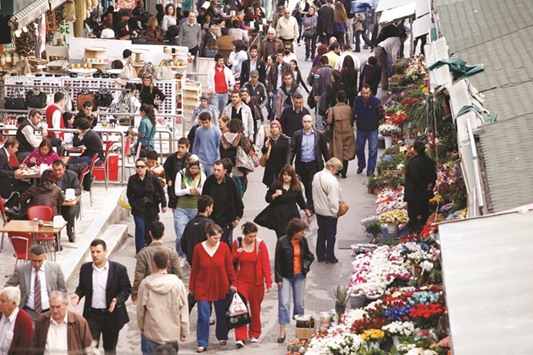At $340 a month, Muhammad Mohsen, a Syrian refugee working at a grocery in Ankara, costs half of what a Turkish employee would.
Turkey is home to the world’s largest Syrian refugee population, and cheap labour like Mohsen’s has slowed inflation, according to a recent central bank study.
That may change.
Under pressure from the European Union, Turkey began granting work permits last month to the millions of Syrian and Iraq refugees it hosts, in a move hailed by the International Monetary Fund as an important step to integrate them. Refugees who become formal workers will be entitled to at least the monthly minimum wage of 1,300 liras ($440) plus benefits, taking their cost to employers to about 2,000 liras.
“Integrating the Syrian work force in the registered economy could increase their cost for employers and could subsequently raise the cost pressure on consumer price inflation,” Sakir Turan, an economist at Odea Bank AS in Istanbul, said by e-mail on February 4. “The inflation could be simultaneously boosted by increased demand for goods.”
The risk of a spike in consumer prices will add pressure on policymakers after inflation edged closer to the double-digit threshold the central bank said it wants to avoid. The inflation rate rose to 9.58% in January, exceeding analysts’ estimates. Central bank Governor Erdem Basci has said price gains won’t drop to the government’s 5% target until 2018. Basci blamed his failure to meet the bank’s inflation target partly on the weak lira, which depreciated around 20% last year.
Mohsen, 30, hasn’t decided whether to apply for a work permit, worried that it might cost him his job in the Onder neighbourhood, an area of businesses with Arabic signboards dubbed “Little Syria” by local Turks.
“My cost would definitely go up, and I don’t think my boss will like it,” Mohsen, who fled to Turkey from Aleppo three years ago, said as he stocked beverages in a refrigerator.
The January 11 cabinet decree allows refugees to work in all sectors, while limiting their numbers to 10% of the total labour force.
The impact of bringing some of the nearly 3mn Syrian and Iraqi refugees into Turkey’s formal labour force may not be seen immediately because they can only apply for a work permit six months after receiving identity cards issued by Turkey.
Yeliz Karabulut, a vice general manager at Alan Menkul Degerler in Istanbul, says it might even take years before the effect on inflation is felt.
“They will remain cheap labour with no security for a long time,” she said by e-mail early this month. “I don’t believe Syrians can find jobs with social security, because Syrians are seen as a cheap work-force.” The one notable exception will be new businesses established by Syrians in Turkey, Eurasia Group analyst James Sawyer said in an e-mail on February 3. “In most cases these businesses have moved across the border but still conduct business with Syria, and they are driving growth in Turkey’s southeast,” he said.
Syrians became partners in nearly one-third of 4,729 companies established with foreign partners in 2015, according to data from the Union of Chambers and Commodity Exchanges of Turkey.
There are already thousands of Syrian entrepreneurs in Turkey’s unreported economy, like Ahmad Shouman, who sells baklava at a quarter of the market price at his three-month-old sweets shop in Ankara. Neither the business nor his workers are registered, which means he doesn’t pay taxes or social security.
“Municipal workers came once and left after inspecting hygiene conditions, without saying anything,” Shouman said.
Refugees have driven down the cost of food staples by 7%, according to the central bank study. At the same time, they’ve pushed up prices of housing, transportation and health care in areas where they have concentrated, said Inan Demir, chief economist at Finansbank.
“They will inevitably drive up inflation, especially on food prices, as long as they can overcome social and language barriers to find jobs,” Ipek Ozkardeskaya, a markets analyst at London Capital Group Ltd, said in an e-mail on February 2. “Any impact on the inflation will be negative.”

Pedestrians walking down Sakarya street in Ankara, Turkey (file). The risk of a spike in consumer prices will add pressure on policymakers after inflation edged closer to the double-digit threshold the central bank said it wants to avoid. The inflation rate rose to 9.58% in January, exceeding analysts’ estimates.
